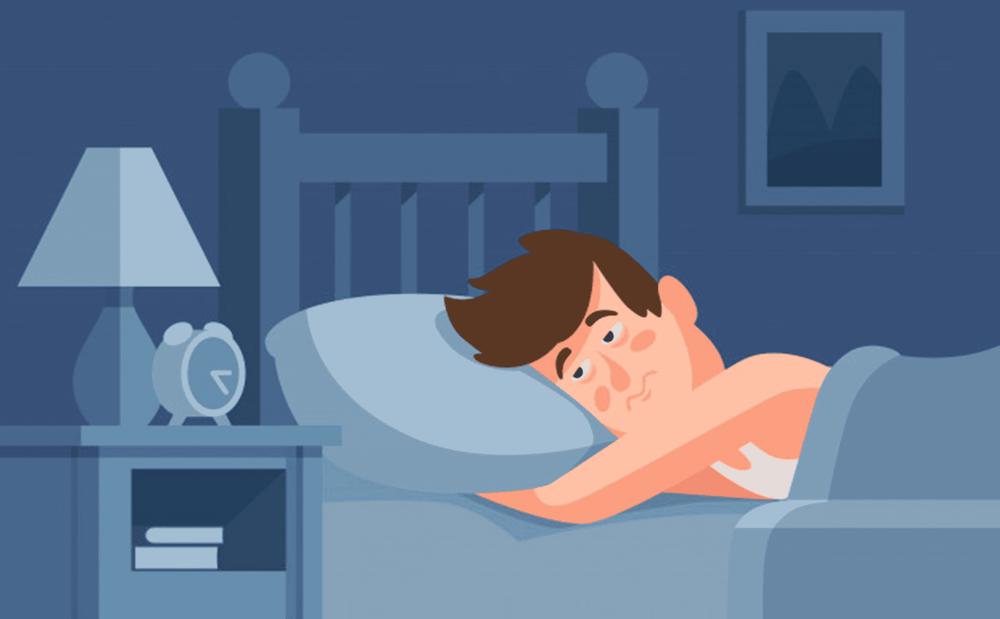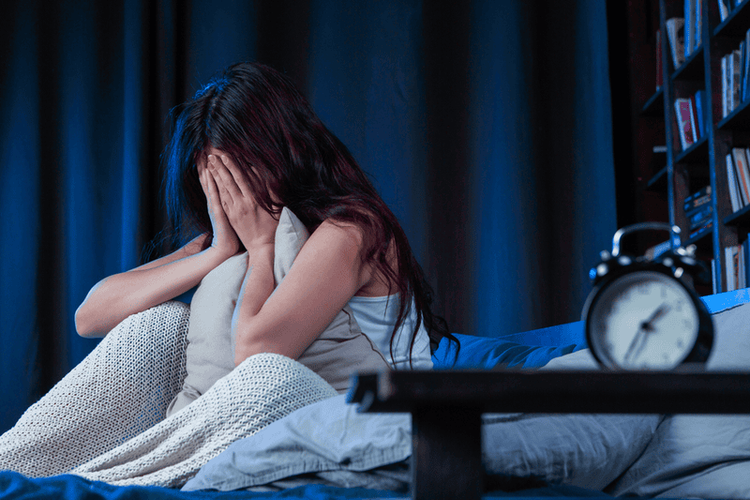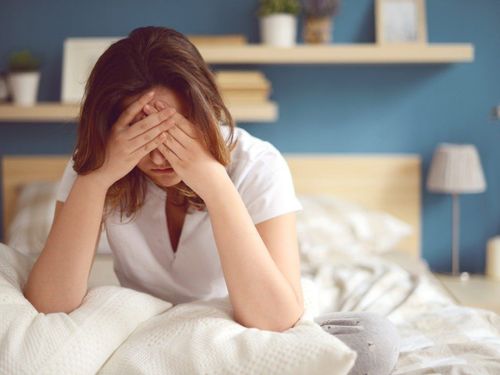This is an automatically translated article.
Insomnia is a common sleep disorder that makes it difficult to fall asleep or stay asleep. Insomnia is divided into several categories, each of which can interfere with your ability to function during the day. Therefore, if insomnia is not treated early, it will seriously affect your health.1. Overview of insomnia
Insomnia is a common sleep disorder that makes it difficult to fall asleep or stay asleep. It leads to sleepiness and not feeling relaxed or refreshed during the day when you wake up. Insomnia can affect anyone, but it is more common in women and the elderly. This condition can last from a few days, a few weeks, or continue for a long time. Stress, menopause, and certain health and mental health conditions are common causes of insomnia.Insomnia can have a number of risks and side effects that affect your mental and physical health, affecting your ability to function.
The risks and side effects of insomnia include:
Reduced performance at work or school Increased risk of accidents Increased risk of depression and other mental health conditions . Increased risk of chronic diseases such as obesity, heart disease and stroke. SEE ALSO: Any solution for insomniacs?
2. Insomnia is divided into what categories?
There are several different forms of insomnia, and each will be characterized by how long it lasts, how it affects sleep, and the underlying cause.2.1 Acute Insomnia Acute Insomnia is a short-term insomnia syndrome that can last from a few days to several weeks. This is the most common type of insomnia. Acute insomnia is also known as corrective insomnia, as it often occurs when you're going through a stressful event, such as the loss of a loved one, or starting a new job. In addition to stress, acute insomnia can also be caused by some of the following:
Environmental factors that disrupt sleep, for example: light, noise,... Sleeping in bed or surroundings unfamiliar, for example a hotel or a new home. Physical discomfort, such as pain or inability to assume a comfortable position. Certain medications Due to medical conditions 2.2 Transient insomnia Transient insomnia lasting less than a week caused by other disturbances such as a change in sleeping environment, stress or depression. The first symptom of transient insomnia is difficulty falling asleep. This type of insomnia can be acute or chronic. Any cause of acute or chronic insomnia can make it difficult to fall asleep. Psychological or psychiatric problems are the most common causes, including stress, anxiety, or even depression.
According to a 2009 study, people with chronic-onset insomnia often have another sleep disorder, such as restless legs syndrome or cyclic limb movement disorder. Caffeine and other stimulants can also be to blame.

Khó bắt đầu giấc ngủ là triệu chứng điển hình của mất ngủ thoáng qua
Common causes of chronic insomnia include:
Chronic conditions such as diabetes, hyperthyroidism, Parkinson's disease, obstructive sleep apnea and sleep apnea. Mental health conditions such as depression, anxiety and attention deficit hyperactivity disorder. Medications include chemotherapy drugs, beta-blockers, and antidepressants. Caffeine and other stimulants, such as alcohol, nicotine, and other drugs. Lifestyle factors, including frequent travel and plane delays, work rotation, and napping. 2.4 Sustained Insomnia Sustained Insomnia is a condition in which it is difficult to fall asleep or wake up too early and it is difficult to return to sleep. The sustained type of insomnia causes you to become anxious and unable to fall back to sleep leading to inadequate sleep. This interferes with deeper sleep and creates a vicious cycle that repeats itself. Sustained insomnia can be caused by mental health conditions, such as depression. Other medical conditions include:
Gastroesophageal reflux disease Sleep apnea Respiratory conditions such as asthma Restless leg syndrome Periodic limb movement disorder MORE: Insomnia is a sign Symptoms of what disease?
2.5 Childhood behavioral insomnia (BIC) affects 25% of children. It is divided into three sub-categories:
BIC at the onset of sleep: This category is the result of negative associations with sleep, such as learning to fall asleep by rocking or cuddling. They can also include being in the presence of a parent or watching TV while sleeping. Limit behavioral insomnia in childhood: This type of insomnia disorder involves children refusing to go to bed and repeatedly trying not to go to sleep. Examples of behavior children want to go to have a drink, go to the toilet or let a parent read to a story. Combined Childhood Behavioral Insomnia: This is a combination of two forms of childhood behavioral insomnia. This happens when a baby has a negative association with sleep and refuses to go to sleep, because a parent or caregiver doesn't set a limit. Behavioral insomnia in childhood can often be resolved with some behavioral changes, for example creating healthy sleep habits, learning self-soothing or relaxation techniques.

Mất ngủ ít nhất 3 ngày mỗi tuần là tình trạng mất ngủ mãn tính
3. Diagnosis and Treatment of Insomnia
Diagnosis of insomnia may include a physical exam, taking a medical history to check for signs of an underlying condition. You may also be asked to keep track of sleep patterns and symptoms that occur in a sleep diary. Your doctor may refer you to a sleep research center to check for other sleep disorders.Treatments for insomnia will vary depending on the cause. You can treat acute insomnia at home with over-the-counter sleep aids or by managing your own stress. Treatment for chronic insomnia needs to address any underlying conditions that are causing the insomnia. Your doctor may recommend cognitive behavioral therapy for insomnia (CBT-I), which has been shown to be more effective than medication.
In a nutshell, different forms of insomnia can interfere with your ability to function during the day. Acute insomnia can often be treated at home. If insomnia is left untreated, it can increase your risk of depression and other serious conditions. If insomnia makes it difficult to function during the day, or if it persists for more than a few weeks, seek medical attention to determine the cause of your insomnia and the most effective treatment.
Currently, to find the cause and determine the insomnia, Vinmec International General Hospital implements the sleep polysomnogram. This is a safe, non-invasive sleep disorder diagnosis similar to an electrocardiogram. The multi-sleep device is specifically designed to measure body activity during sleep, so it will help patients relax, pain-free while sleeping. The electrodes are glued to the scalp, near the eyes, near the chin, on the chest, near the nose and mouth....no pain. The patient is given a wireless transmitter and transmits the received signals to the server, without hindering travel. After the polysomnography was completed, the machine's electrodes were gently removed.
Through the indicators given by the sleep polygraph, it is possible to help doctors at Vinmec best diagnose different types of sleep disorders, know what kind of sleep disorder the patient is suffering from. for appropriate treatment guidelines.
Please dial HOTLINE for more information or register for an appointment HERE. Download MyVinmec app to make appointments faster and to manage your bookings easily.
Reference sources: medicinenet.com, healthline.com





![[Vinmec - Q&A with experts] Topic 01: Insomnia](/static/uploads/small_20190716_042752_932594_hoi_dap_cung_chuyen_max_1800x1800_jpg_28a5ee22bf.jpg)
![[Vinmec - Q&A with experts] Number 01: Insomnia topic (Part 3)](/static/uploads/small_20190717_084630_482834_mat_ngu_1_max_1800x1800_jpg_76aa7deed5.jpg)





